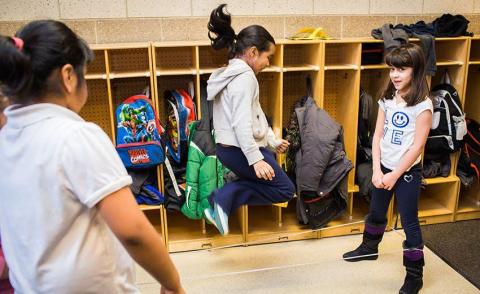
Supporting Social and Emotional Learning through Every Student Succeeds Act
A core component of a healthy school environment is supporting social and emotional learning. Social and emotional learning includes knowledge and skills such as understanding and managing emotions, setting and achieving positive goals, feeling and showing empathy for others and making responsible decisions. These abilities help students and adults form healthy working relationships with others, stick with challenging problems and pursue long-term goals. Research has shown these skills matter to students’ long-term success.
Despite growing evidence that social and emotional learning is important to college and career success, these skills are largely unmeasured in schools and have not been adequately supported by education policy. The new Every Student Succeeds Act (ESSA), which replaces No Child Left Behind, has the potential to change that. As Healthy Schools Campaign has written about before, ESSA offers a new pathway for supporting the whole child and specifically acknowledges the importance of supporting social and emotional learning in schools. As a result, there is an important opportunity on hand to change the education landscape to ensure social and emotional learning is supported in the nation’s schools.
New opportunities within ESSA for supporting social and emotional learning include :
-
State accountability systems: ESSA provides states and school districts with more flexibility in terms of how they define and assess student success. The law specifically requires states and school districts to include at least one measure of school quality and student success in their new accountability systems. Examples of measures of school quality and student success include school climate, student engagement and safety. Requiring the inclusion of these non-academic indicators in accountability systems is an important step towards elevating the connection between student physical and emotional health and academic success.
-
School improvement: ESSA requires the inclusion of key stakeholders, including specialized instructional support personnel in the development of state and district school improvement plans. These plans are intended to support students most at risk for academic failure and should address school climate and safety in addition to supporting the mental and behavioral health of students. Overall, ESSA provides states and school districts with more flexibility in developing and implementing their school improvement plans which presents an important opportunity for ensuring these plans support social and emotional learning.
-
Professional development: Under No Child Left Behind, professional development funding could only be used to support professional development around core academic subjects. Under ESSA, there is greater flexibility in terms of what professional development funding can be spent on which presents an important opportunity to provide school staff with the knowledge and skills to support social and emotional learning. For example, under ESSA school districts can use professional development funding to train school personnel on how to link at-risk children with appropriate treatment and intervention services and how to support children affected by trauma.
-
Funding for safe and healthy students. A key component of ESSA is Title IV, which authorizes funding for programming to support safe and healthy students. In order to access this funding, school districts are now required to complete a comprehensive needs assessment every three years to better understand student needs within their community. Funding from Title IV can then be used to address those needs. If social and emotional learning is identified as a need through this assessment, Title IV funding could then be used to implement associated programming. ESSA specifically highlights that Title IV funding can be used to foster “healthy, supportive and drug-free environments that support student academic achievement,” improve “instructional practices for developing relationship-building skills, such as effective communication,” provide “mentoring and school counseling to all students” and implement “school-wide positive behavioral interventions and supports.”
Healthy Schools Campaign is actively working to ensure that schools across the country can leverage these opportunities. One of the primary ways in which we will support this work is through the National Collaborative on Education and Health which we co-convene with Trust for America’s Health. The Collaborative will be reviewing these key opportunities for supporting social and emotional learning and student health and working to develop strategies that states and schools can use.
ESSA is an important opportunity for supporting the whole child and we look forward to working with our partners to ensure social and emotional learning remain a key part of ESSA implementation.



The views and opinions expressed in this post are those of the author(s) and do not necessarily reflect those of MomsRising.org.
MomsRising.org strongly encourages our readers to post comments in response to blog posts. We value diversity of opinions and perspectives. Our goals for this space are to be educational, thought-provoking, and respectful. So we actively moderate comments and we reserve the right to edit or remove comments that undermine these goals. Thanks!